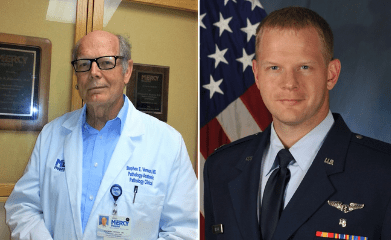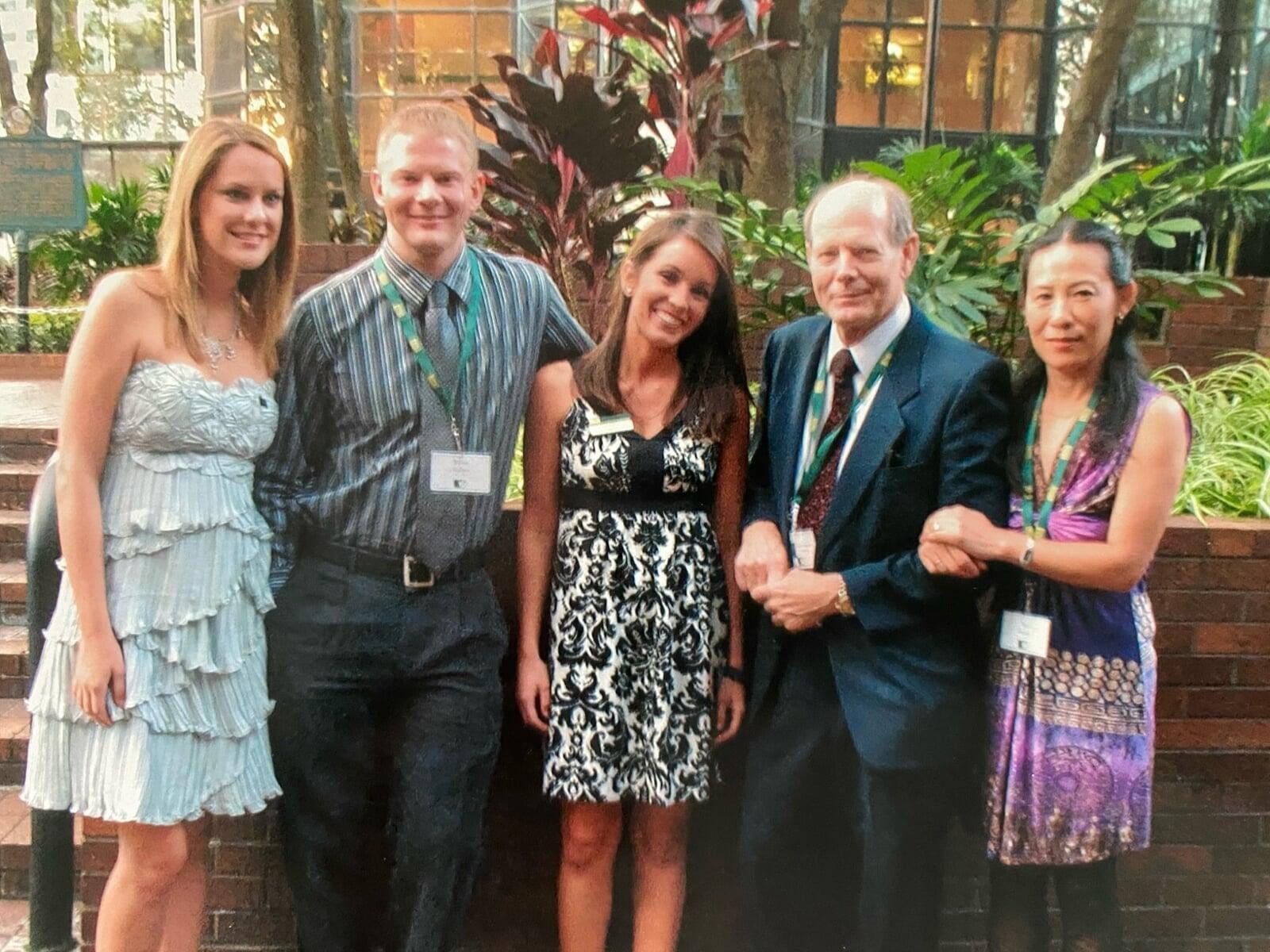
Every now and then, we find ourselves in relationships that seem to have occurred by happenstance but that evolve into something very powerful and inspiring. That is the story of Drs. Vernon and Wilson. They met in 2009 when Dr. Wilson, a medical student at the time, was asked to serve as a student ambassador at the annual USF Health Morsani College of Medicine reunion. Dr. Vernon was in attendance for the 35th anniversary of his medical school graduation. A chance meeting, but a meeting that led to a relationship centered around a shared passion for medical education, which has now endured over 10 years.
Dr. Steve Vernon, an alumnus of the Morsani College of Medicine’s Charter Class of 1974, is retired after 45 years as a pathologist in academic and private practice settings. When he returned to Florida following his residency at the University of California, Los Angeles, he brought with him a keen interest in medical education and continuing medical education (CME). In the early 1980s, he joined the medical education committees of both the Florida Society of Pathologists and St. Francis Hospital in Miami, where he practiced. At the time, the field of CME was evolving, culminating in the development of the Accreditation Council for Continuing Medical Education (ACCME) in 1983. It was opportune timing for Dr. Vernon to become deeply rooted in pursuing his passion at an early stage in his career. He became active in the ACCME as a member of their committee for review and recognition and, in 1986, he became the director of medical education at Mercy Hospital in Miami. Through the 2000s, he enjoyed a dynamic role in the Florida Medical Association (FMA) and was invited to chair the FMA Committee for Accreditation and CME. It is a role he has carried with him into retirement. His chance meeting with Dr. Wilson in 2009, and their shared passion, has provided the foundation for the next chapter in Dr. Vernon’s journey: mentoring Dr. Wilson to take his place at the helm of the FMA committee he has loyally served for many years.
Dr. Zach Wilson is a 2011 Morsani College of Medicine alumnus who completed his emergency medicine residency in 2014, served over four years in the United States Air Force and is now not only a flight surgeon in the USAF Reserve but is also serving as interim director of the emergency department at Fort Walton Beach Medical Center. He says the connection with Dr. Vernon blossomed when Dr. Vernon served as a judge for a poster that he presented at an FMA annual meeting during his intern year. Dr. Vernon was a tough judge, criticizing the very small font size that meant there was too much information on the poster! Rather than take offense, Dr. Wilson recognized the value of that feedback and the passion for medical education that the two of them shared. Dr. Vernon encouraged him to join the FMA Committee for Accreditation and CME, which he did. Under Dr. Vernon’s mentorship, Dr. Wilson has learned the rules and regulations around CME and cemented his ongoing interest in the area, so much so that he has accepted Dr. Vernon’s invitation to replace him in the chair role for this committee. His only request was that Dr. Vernon remain in a mentorship role for him as he makes the transition, something Dr. Vernon has gladly agreed to do.

Both acknowledge that their relationship as mentor and mentee evolved from a chance meeting at a social event. Dr. Wilson knew intuitively that it was becoming that type of connection, but he discourages anyone from believing that you must find a mentor via a specific ‘ask’ or ‘program.’ Dr. Vernon says that he would never have imagined an ‘elderly’ pathologist becoming a mentor to a young emergency medicine physician but that it should not have completely surprised him – he was brought into the fold of his work with the FMA by an elderly radiologist when he was a younger pathologist. At the end of the day, you just cannot tell where a mentor might come from or who they might be. The key is to be open to the idea and be unafraid to accept the input and feedback that comes from the opportunity.
When asked if either have had mentors outside of medicine, both were quick to share personal stories of other mentors they have encountered along the way. Dr. Wilson’s perspective is that “we are not just doctors, we are humans.” He believes that if you pigeon-hole yourself by having only mentors from your particular specialty, you really miss out on the wisdom that others can bring. He has taken advantage of those who support his spiritual needs, including participating in medical mission trips with a USF faculty member and seeking the input and support from the leader of his men’s Bible study group. Dr. Vernon agreed that if you think mentors are going to be only other MDs, you are probably wrong. Being open to the idea of being a mentee or being mentored by those outside your field opens up the world. He found himself doing things like professional fishing and becoming an expert on tropical plants through connections he developed with mentors. He is very grateful for those opportunities and is passionate in encouraging others to be open to the idea of variety in your mentoring relationships.
As for how to get started along the path of finding a mentor, Dr. Vernon suggests professional societies, like the Florida Society of Pathologists, where more formal mentoring programs exist. Dr. Wilson agreed that those types of more formal programs are very helpful; many may want to be mentors or mentees and those types of programs do take the guesswork and, perhaps, awkwardness out of finding your way. He also stressed the importance of mentors making themselves approachable as young mentees are often intimidated but, he says, it is a two-way street and mentees must be willing to go that extra mile, to seek people out and offer your help in any capacity. Finally, he emphasized that mentor relationships come in all sizes and shapes: some may be a formal program and commitment, but others are as simple as a quick conversation in a hallway or over a cup of coffee. The takeaway is to be open, be flexible, and realize that you do not have to start with the question, “Will you be my mentor?”
Dr. Wilson’s closing message for this interview is powerful and something to which we should all aspire: “As physicians, we should not have the right to say no to the opportunity to mentor. We all owe a huge debt of gratitude to those who helped us get to where we are in our lives. Whether we recognized them for being mentors or not, that’s what they were, and we should all be happy and willing to pay it forward through mentoring. It can be a conversation or a lifelong relationship. The general willingness to help and give advice and counsel is at the heart of what a mentorship is.”
-lw-scaled.png.png)